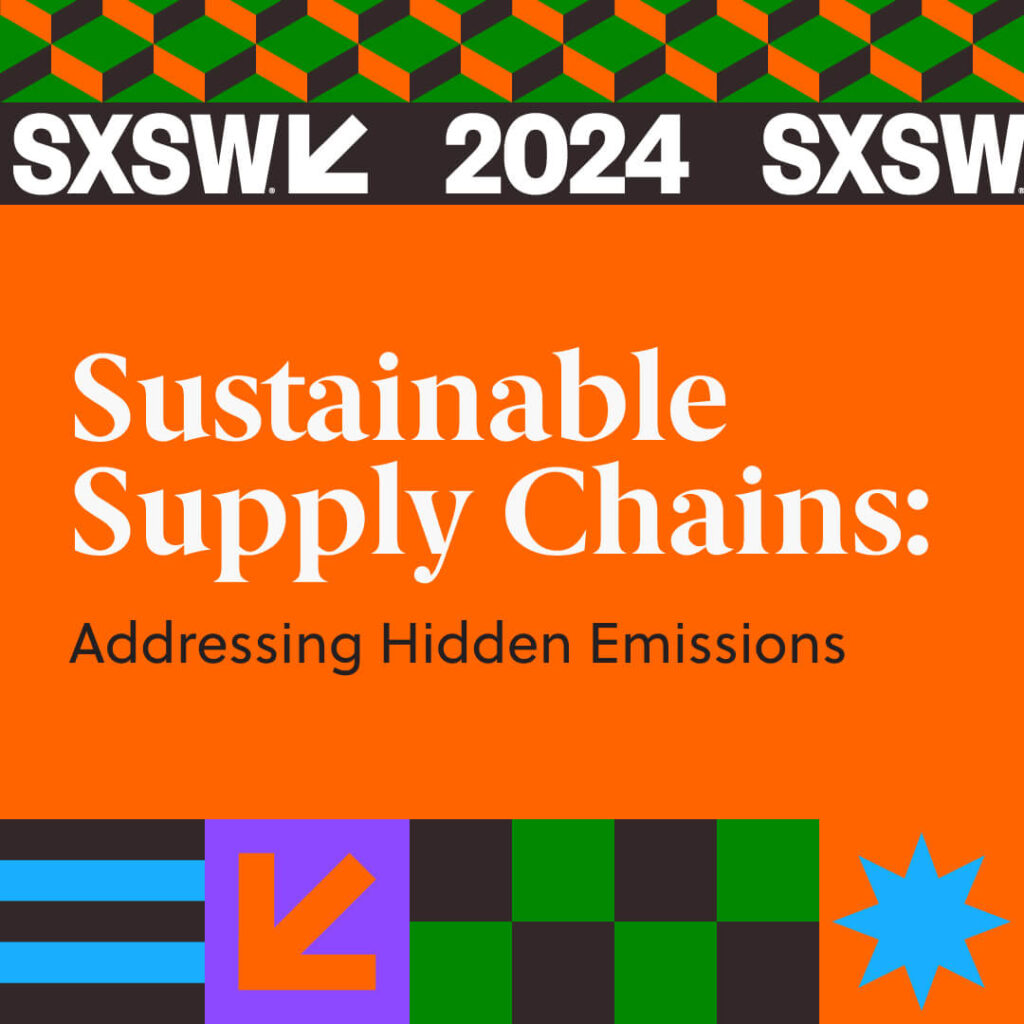New SEC Climate Disclosure Rules: Navigating Opportunities and Legal Boundaries


At SXSW 2024, we hosted a panel titled “Sustainable Supply Chains: Addressing Hidden Emissions.” We were thrilled to have Caitlin Leibert from Whole Foods Market and Sean McPhillips from Asana join us to discuss the intricacies of hidden emissions within supply chains. If you couldn’t join us at SXSW 2024 or want to revisit the insights shared, our recap blog post provides a comprehensive overview of the session’s key points and discussions.
The SEC recently voted on updates to its climate-disclosure rules effective in 2026, excluding Scope 3 emissions.
In a landmark move, the Securities and Exchange Commission (SEC) recently voted on March 6, 2024, to adopt new rules aimed at bolstering transparency around climate-related risks for investors, a decision reflecting the growing global urgency to integrate environmental considerations into the financial sphere. These rules, initially proposed in March 2022 and the subject of more than 24,000 comments over this two year process to adoption, mark a significant stride towards providing investors with consistent, comparable, and reliable information regarding the financial impacts of climate change on businesses.
Key Components of the Final Rules
The finalized rules, set to take effect in 2026, mandate the disclosure of material climate-related risks in SEC filings. Public companies will now be required to divulge how climate risks may influence their operations, strategies, and financial conditions. Moreover, the rules necessitate disclosure of efforts to mitigate or adapt to these risks, along with oversight from boards and management.
One pivotal aspect is the mandatory reporting of Scope 1 and Scope 2 emissions for companies that determine these emissions to have a material impact. In the initial draft of these rules, Scope 1 and 2 emissions reporting were to be mandatory for all public companies. Another noteworthy update from the rules as drafted to the final is the exclusion of any Scope 3 reporting. While adjusted language for Scope 1 and 2 reporting coupled with dropping Scope 3 emissions reporting from the final rules lessens the potential legal challenge, there’s still contention surrounding the SEC’s authority in enforcing such reporting, raising legal debates on jurisdictional boundaries.
Navigating Legal Complexities
Critically, the exclusion of Scope 3 reporting reflects the SEC’s strategic move to mitigate legal challenges. Scope 3 reporting would have entailed private companies’ involvement, potentially encroaching on areas outside the SEC’s regulatory purview. This omission aims to strengthen the rule’s legal resilience, although its success remains uncertain.
Implications for Public Companies
Public companies now face phased compliance deadlines based on their filer status. These regulations herald a new era, prompting businesses, especially those in climate-vulnerable sectors, to reassess their strategies and disclosures. The rules not only facilitate better risk assessment for investors but also incentivize proactive climate management within companies.
Opportunities in Carbon Markets
Amidst these regulatory shifts, there lies a significant opportunity for carbon markets to flourish. As companies strive to comply with emissions reporting, demand for carbon offset projects is poised to surge. Carbon markets offer innovative solutions for companies to offset their emissions, driving investments in emerging climate tech, renewable energy, and sustainable practices.
Conclusion
The SEC’s new climate disclosure rules signal a pivotal step towards fostering transparency and accountability in corporate climate risk management. While navigating legal complexities remains a challenge, these regulations pave the way for a more sustainable and resilient future. Embracing these changes presents not only regulatory compliance but also opportunities for businesses to thrive in a carbon-conscious economy. Whether looking for guidance on Scope 1 and 2 emissions reporting or procuring carbon offset credits, our team is here to collaborate with you. Contact us today to learn more.
Scope 1 emissions are direct emissions from owned or controlled sources. Scope 2 emissions are indirect emissions from the generation of purchased electricity, steam, heating, and cooling consumed by the reporting company. Scope 3 emissions are all indirect emissions (not included in Scope 2) that occur in the value chain of the reporting company, including both upstream and downstream emissions. The SEC’s new rules mandate the reporting of Scope 1 and Scope 2 emissions for companies that identify these as materially impactful to their business, but notably, they have excluded the requirement for Scope 3 emissions reporting.
The SEC excluded Scope 3 emissions from the final rules to minimize legal challenges and focus on areas within its regulatory authority. Scope 3 reporting would require disclosures related to emissions from activities not directly controlled by the company, including those from suppliers and customers. This could potentially extend the SEC’s reach into regulating practices beyond its traditional jurisdiction, raising concerns about enforceability and legal authority.
The new rules are designed to provide investors with more consistent, comparable, and reliable information regarding the financial impacts of climate change on businesses. This enhanced transparency will allow investors to make more informed decisions by understanding how companies are exposed to and managing climate-related risks. It aims to level the playing field among public companies, giving investors a clearer view of which companies are better prepared for the challenges and opportunities presented by climate change.
The phased compliance deadlines are set based on the filer status of public companies, allowing them different time frames to comply with the new rules. This approach aims to give companies adequate time to adjust their reporting processes and ensure that they can meet the new requirements effectively. Smaller reporting companies will have more time to comply, recognizing the varying capacities and resources among public companies to gather and disclose the required information.
Companies can prepare for the new disclosure requirements by first assessing how climate risks impact their operations, strategies, and financial conditions. This involves identifying material climate risks and the current state of emissions data management within the company. Developing or enhancing systems to accurately measure, track, and report Scope 1 and Scope 2 emissions will be crucial. Companies should also consider engaging with stakeholders, including investors and regulators, to understand expectations and gather feedback on their disclosure practices. Proactively seeking guidance and support from sustainability and decarbonization experts, like CarbonBetter, can also provide valuable insights and strategies to navigate these changes effectively.

About the Author
Dominic Sung is a Director of Business Development for CarbonBetter. He joined the company in 2022 with a focus on growing the Climate Services business by partnering with clients on their sustainability journey to measure, report, and reduce their emissions in a transparent, traceable, and pragmatic way.


